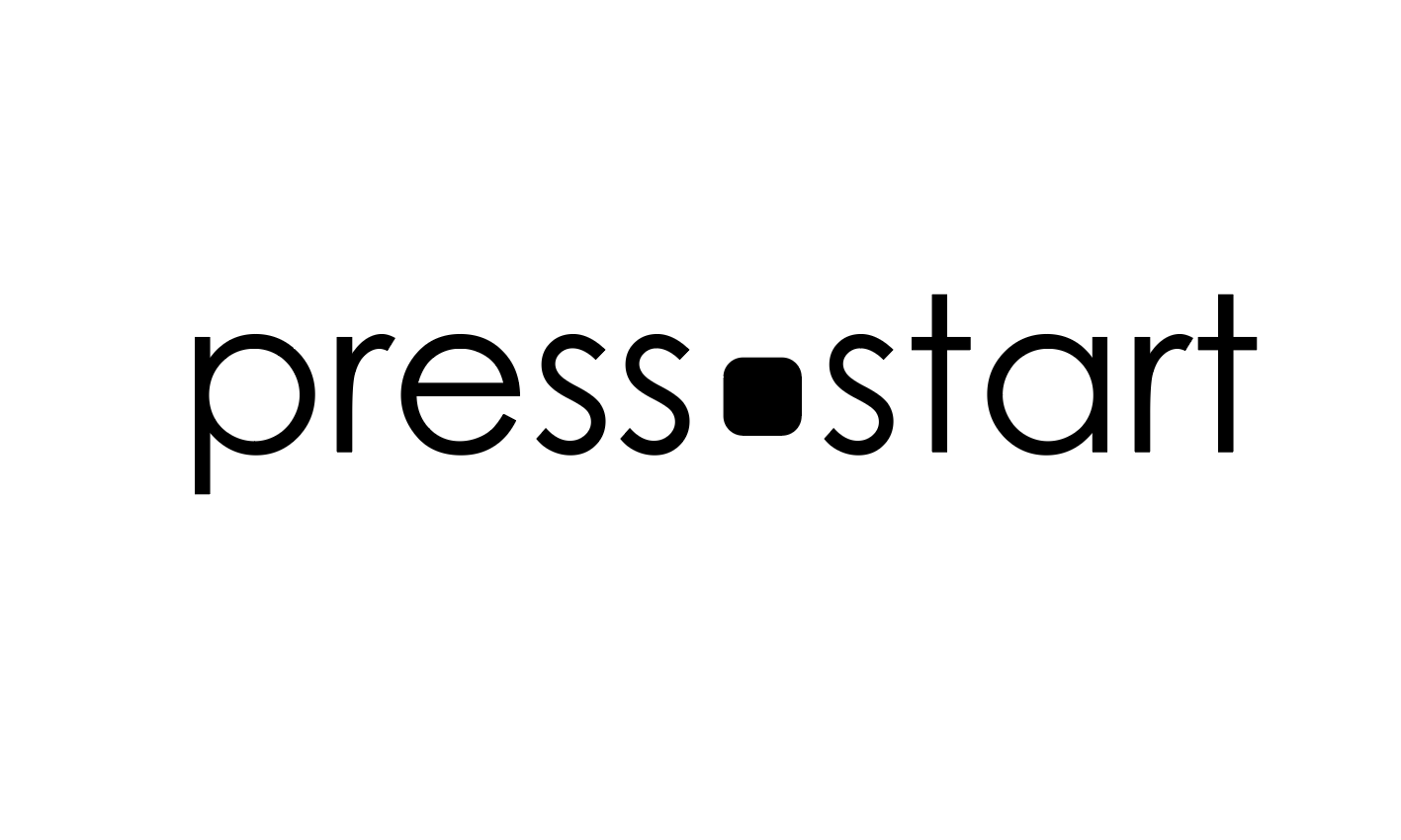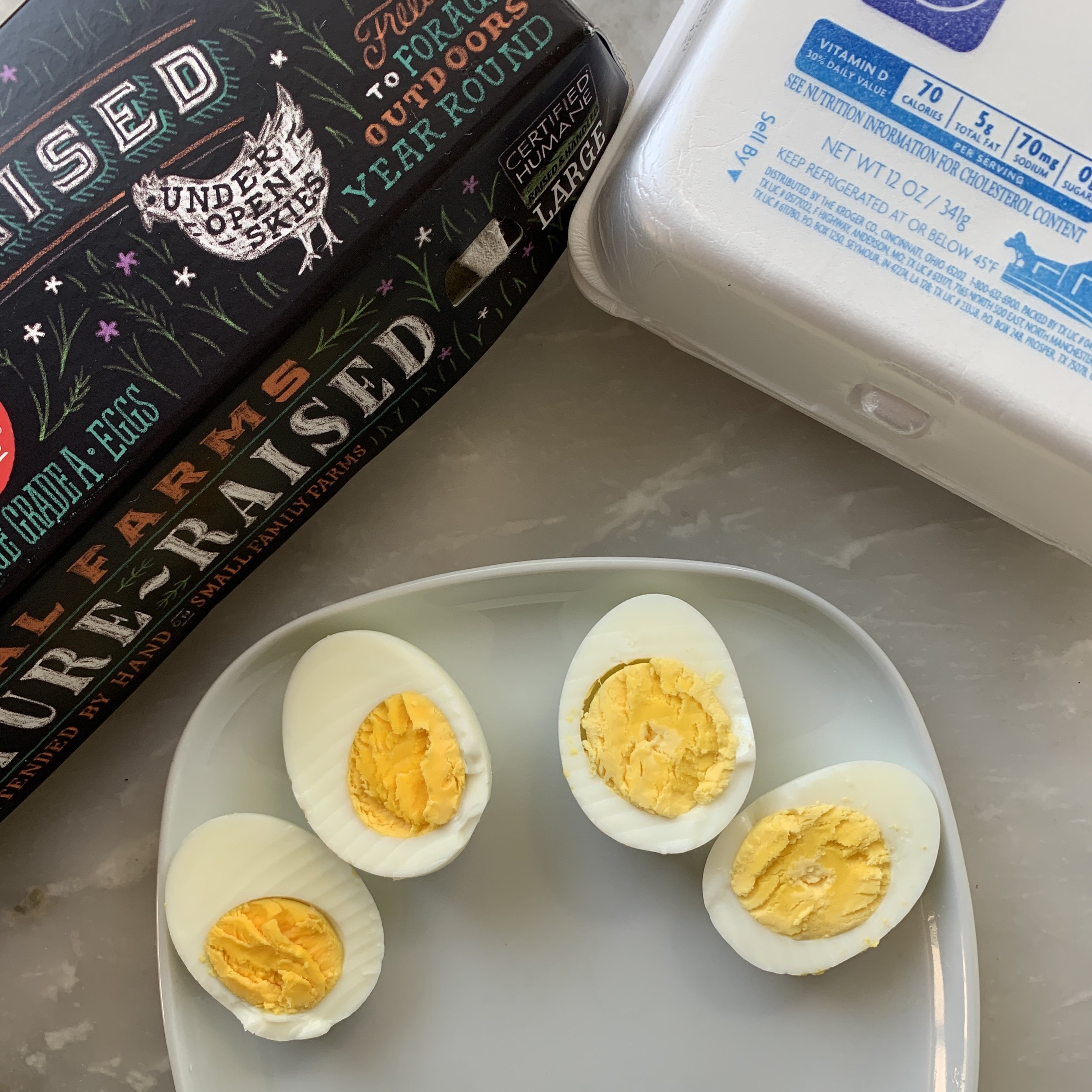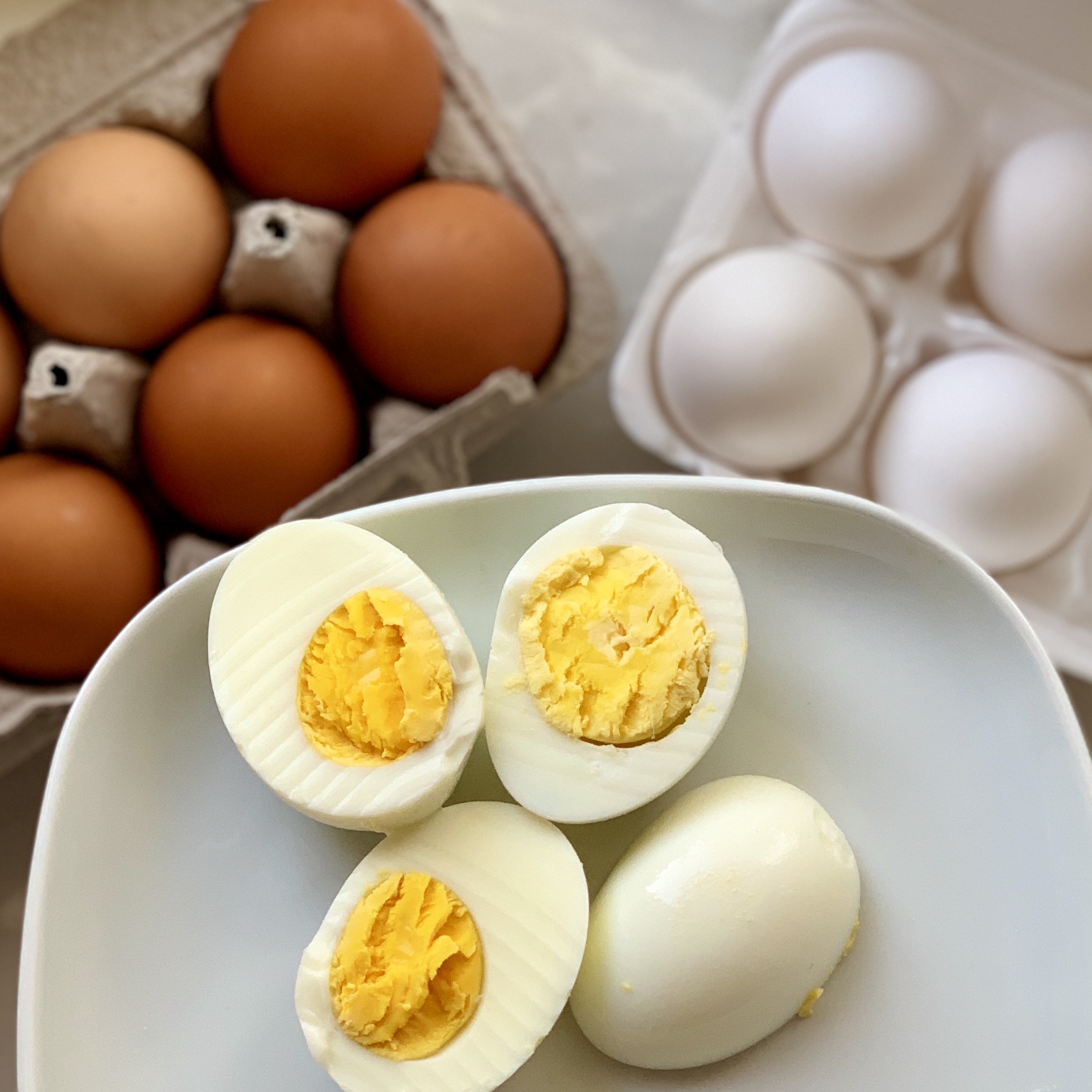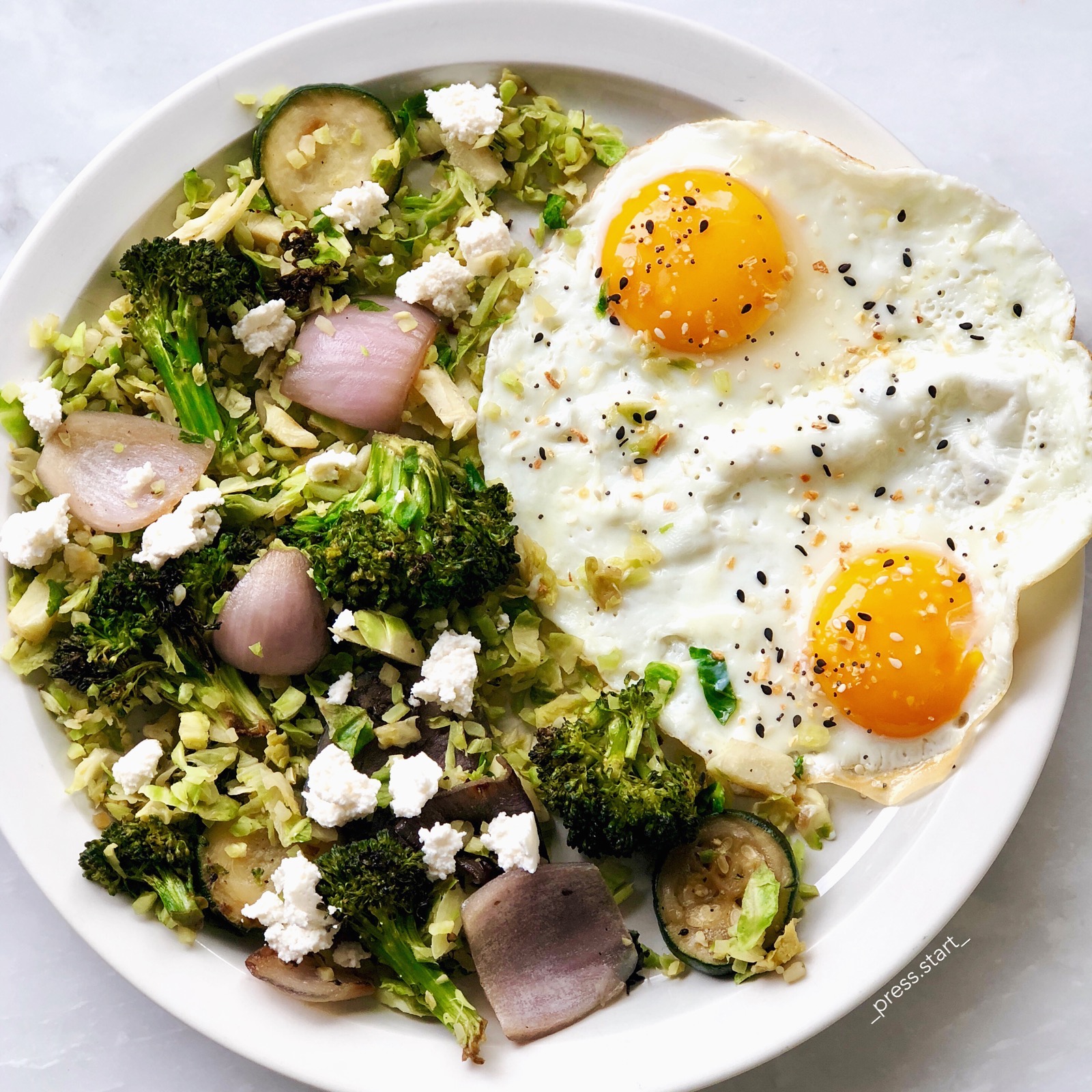Grocery stores are now so full with SO many different options for eggs: cage-free, organic cage-free, omega-3, pasture-raised, free-range … AHHH! It can make anyone feel overwhelmed. This is why I am getting into what the different classifications mean and how each one changes how the chickens were treated, the nutrient value of the eggs for YOU etc.
Pasture-Raised:
One of my favorite things to make with pasture-raised eggs is shakshuka!
This means the chickens are allowed to eat what they want while roaming around outside. It is the only classification that tells you how a chicken was fed, and thus, how nutrient-dense the egg is. Pasture raised chickens are let out of the barns early in the morning and called back in before nightfall and each chicken must have at least 108 square feet to roam in. They eat healthy diets that consist of things like bugs and seeds they find on the ground - foods they are biologically meant to eat (from a pasture) (1). Pasture-raised chickens also live a nicer life roaming around and are overall healthier and not inflamed. As compared to conventional chickens who are often stuffed into cramped and brutal conditions called “CAFOs” (concentrated animal feeding operations) (4). This is one place I think the extra $ to buy pasture-raised is DEFINITELY worth it! As you will read below, most of the other classifications, that are still a markup from conventional eggs, do not offer many health benefits to the end consumer of the eggs or the chickens. We vote with our dollars! We vote for our own health and also we vote for the farming conditions. See benefits of pasture raised eggs below:
Pasture-raised eggs have yolks with healthier fats. A 2003, study showed that pasture-raised egg yolks contained 3 times more omega-3s than their conventional counterparts (2). If you remember my fat blog, these are ANTI-inflammatory fats. Because their diet is full of anti-inflammatory omega 3s rather than pro-inflammatory omega 6s that will result from a diet full of corn/grains/soy, fillers and antibiotics given to conventional chickens.
Pasture-raised egg yolks are also richer in other fat-soluble vitamins like A&E. In fact, they are about 40% higher in these vitamins than conventional egg yolks. The longer the chickens are on the pasture, the higher these percentages (2).
Pasture-raised egg yolks have half the omega 6:3 ratio of conventional eggs, which, is beneficial because omega-6 fats are pro-inflammatory and omega-3 fats are anti-inflammatory (8). This we want a LOWER omega 6:3 ratio to improve inflammation. You can read more about these fats in my fat blog post.
The signifiant sunlight exposure that pasture-raised hens receive, from being allowed to roam outside all day, translates to as much as 4 to 6 times more vitamin D than conventional eggs (3)
Pasture-raised eggs are often superior from an agricultural standpoint too. When hens graze, manage their own feed and spread their own manure, farmers have less work and need less equipment, which translates to a smaller bio footprint (1).
Pasture-raised, organic eggs are also 7 times less likely to contain salmonella than conventional eggs. And actually, the salmonella risk in conventional eggs is pretty low as it is (about 1 in 12,000 to 1 in 30,000) so the risk for pasture-raised organic eggs is about 1 in 84,000 to 1 in 210,00 (5).
Pasture-raised eggs are also one of nature’s best sources of choline! Choline is a crucial nutrient that makes up our cell membranes and helps our neurotransmitters function (this means it helps our memory, muscle control, mood and more) (6). This nutrient is also extremely important for pregnant women, and about 94% of pregnant women don’t get enough! (7) To read more about what this nutrient does for developing babies, read my prenatal nutrition blog post here.
Free range:
Don’t forget to read my prenatal nutrition blog post on why eggs, specifically pasture-raised, are so important during pregnancy!
This term is regulated by the USDA but has vague standards and only means chickens had access to the outdoors but does not say if they actually went outside at all/ for how many hours a day and completely ignores what they were fed. The chickens could be in a coop with a screen door and technically could leave that but do not have any minimum outdoor time so sometimes they are actually kept in cages all day (9). They must have 2 square feet to themselves outside, but again, may not have actually gone in those 2 feet. They also could have been (and often are) fed a corn and soy and/or an antibiotic rich diet. And also that corn and soy and grain-based diet is most likely GMO unless it says otherwise. GMOs are not bad in of themselves but they are sprayed with glyphosate (also known as Roundup) which is a known carcinogen that has been proven to increase cancer risk by over 40% and causes other widespread bodily harm (10). 94% of corn and soy in the US in 2018 was GMO so you can pretty much bet your free-range chickens ate GMO feed unless otherwise specified (see below on non-GMO). Therefore, these eggs are much less nutrient-dense and higher in pro-inflammatory omega-6s and lower in anti-inflammatory omega-3s than pasture-raised eggs. This is a classification that you will pay extra for that doesn’t say all that much.
Cage-Free:
These hens don’t live in cages but that doesn’t exactly mean they are “free” like the name implies. They are usually raised in aviaries and they are only required to have about 1 square foot of space to themselves, so their living quarters are often very cramped. This classification is also USDA regulated but again, does not say anything about what the hens are fed (1, 9). Their lives are not usually much more pleasant or healthy than caged hens given how cramped the quarters usually are. If the cage-free has an organic or non-gmo verification ALONG with the cage-free verification, then of course, it tells you more about what the chickens were fed. But in the absence of that, you can assume it’s GMO corn and soy, the most common and cheapest feed for farmers to feed chickens. Therefore, these eggs are much less nutrient-dense and higher in pro-inflammatory omega-6s and lower in anti-inflammatory omega-3s than pasture-raised eggs. Another classification that does not really improve anyone’s quality of life much but still does cost extra.
Caged:
These chickens are confined to cages with 67 square inches of space per chicken. They often never see the light of day and are confined to these cages for their entire egg laying lives. The classification does not inherently say anything about what the chickens were fed, but in these situations it is usually a corn and soy diet (again, GMO unless otherwise specified) (1). Therefore, these eggs are much less nutrient-dense and higher in pro-inflammatory omega-6s and lower in anti-inflammatory omega-3s than pasture-raised eggs. About 90% of the eggs sold in the US come from caged eggs (10).
This chart shows you how much room the chickens get in each classification.
organic
This is another USDA regulated term. This means that the hens that laid the eggs must come from a free-range environment (described above) or better and fed organic feed not sprayed with synthetic pesticides and that they were not given hormones or antibiotics (9). This is another certification that I DO believe it is worth to pay extra for, since it ensures a healthier egg. However, if you see a pasture-raised egg that is not organic but is non-GMO project verified, I think that’s just as good. So it’s worth it to weigh your personal budget and egg availabilities with the available certifications. Personally, we usually buy non-GMO project verified pasture-raised (but not organic) eggs in our house since we go through a LOT of eggs and that’s more budget friendly and basically as nutritious in my opinion.
Some additional third-party verified classifications
Non-GMO project verified
This neon yolk tells you this egg is pasture-raised!
This means the farm that raised the hens has to go through a third party approval process through the Non-GMO project verification committee. If eggs contain the Non-GMO project verified logo on them, then it means that the chickens were not fed GMO feed (11). If you see this verification on one of the less stringent egg certifications (free-range, cage-free etc.) it definitely makes it a better choice. Probably not better than pasture-raised but if comparing two different free-range brands, and you see the non-GMO on one, I would pick that one to avoid glyphosate contamination (explained above). This certification can be layered on top of any of the above certifications.
Certified Humane
This third-party seal means that the hens have very specific pasture requirements and can be given on top of a certification like free-range or pasture-raised. Hens raised with this certification were allowed to roam freely on the pasture during the daylight hours. Hens forage, run, perch, bathe and socialize as much or as little as they choose. The farms give the hens tents for shade, water coolers and, in some cases, trees where they love to hang out. Every farm with this seal is audited by an inspector who must have a master’s degree or a doctorate in animal science and be an expert on the species he or she inspects. Additionally, there is a traceability audit done for every egg that has this seal to make sure it came from a farm that was certified humane (1).
Classifications that don’t mean anything
Natural:
This classification literally means nothing, since chickens are a part of nature so any egg could be considered “natural”(9). However, it says nothing about the conditions the chickens were raised in and often that can be extremely UN-natural conditions (cramped, cages, no sunlight or movement etc.) I’d ignore this classification in the absence of another classification.
Hormone-free:
It’s illegal to give chickens (not cows) hormones in the US, so this label also doesn’t mean much (9) since your eggs should be hormone-free as long as you are just following the law. Not something to pay extra for, bare minimum.
Farm Fresh
This claim is not regulated and therefore means nothing. Any farm can write “farm fresh” on their eggs but it says nothing about how the hens were raised, the health of the chickens or how “fresh” the eggs actually are (time from hen to store shelf) (9). I’d ignore this claim.
Vegetarian Diet
This is a very confusing claim, that once again, does not make for a better egg. Chickens are not meant to be vegetarians (9). They are only forced to be vegetarians when they are not allowed to roam and graze naturally (as mentioned in the pasture-raised section, chickens love to eat all types of insects). Chickens fed an 100% corn or soy diet are vegetarians, but again, this will lead to a more inflammatory fatty acid profile of the egg yolk and also less nutrient density AND with more corn and soy in the chickens diet, it is more likely that they are fed GMO food (again glyphosate concern). So I would avoid this label. Chickens are omnivores!
so what eggs should i buy?
More yummy pasture-raised eggs! These are non-GMO project verified but not organic. And you can still see a bright orange yolk (which means healthy chicken and nutrient-dense egg!)
This will really be a decision to be made each time you are purchasing eggs based on what’s available and your budget. However, if pasture-raised eggs (whether organic or not) are available to you, I HIGHLY recommend those. It is the only classification that holds any real weight in how the healthy the chickens were, how they were raised, and HOW NUTRIENT-DENSE the egg itself is. It also is the only one that reduces some potentially unhealthy properties of eggs (pro-inflammatory omega-6s). So paying more for pasture-raised eggs is an investment in your health. It is also a vote with your dollar towards better treatment of chickens!
While free-range and cage-free are almost always cheaper than pasture-raised, these certifications are not extremely useful. If you look at the treatment requirements and the chart above about the space the chickens get, you can see they are not THAT different than caged eggs. And the only reason the price is so much lower, is because it’s cheap to raise hens in confined spaces with little access to the outdoors. Also, you will SEE and TASTE the difference between pasture-raised eggs and other eggs. Allowing chickens to eat what they want (an omnivorous, nutrient-dense diet) will give the yolk a deep dark yellow or orange color. Chickens fed primarily corn or soy, do not have this color and have a pale yellow yolk that shows there are less nutrients in there. If you do a blind taste-test, I guarantee you’ll choose the pasture-raised egg over the conventional egg.
All that being said, just DO YOUR BEST. If your grocery store only has cage-free or conventional as the options, definitely go for cage-free. It is still better than caged. Also, adding “organic” or “non-GMO” onto any of these classifications definitely makes it better for the chicken and you (no bad pesticides on their feed and thus in the egg). Also, don’t sweat the small stuff. When you go out to eat, and order an omelet for brunch, chances are it won’t be a pasture-raised egg unless you’re eating at a super “conscious” restaurant in somewhere like Portland or Brooklyn. So just eat your omelet and enjoy it. BUT when it comes time for you to go to the store and vote with your dollar and make an investment in your health, you CAN make a better choice. It’s really what you eat most of the time that will make the biggest impact, so now that you are armed with knowledge stock your home with egg-celent eggs but don’t stress out if you can’t get that 100% of the time when you are on the go.
This post is in no way sponsored, I merely want to shed some light on what may be confusing a lot of people at the grocery store.
PS eat the yolk, it’s the most nutrient-dense part of the egg and dietary cholesterol is NOT what raises blood cholesterol… but that’s a whole other post :)
References
https://certifiedhumane.org/article-explains-difference-pasture-raised-free-range-eggs/
https://news.psu.edu/story/140750/2003/05/01/research/pasture-ized-poultry
https://www.ncbi.nlm.nih.gov/pubmed/24607306
https://www.nrcs.usda.gov/wps/portal/nrcs/main/national/plantsanimals/livestock/afo/
https://www.ncbi.nlm.nih.gov/pubmed/11028959
https://ods.od.nih.gov/factsheets/Choline-HealthProfessional/
https://www.ncbi.nlm.nih.gov/pubmed/26886842
https://www.cambridge.org/core/journals/renewable-agriculture-and-food-systems/article/vitamins-a-e-and-fatty-acid-composition-of-the-eggs-of-caged-hens-and-pastured-hens/552BA04E5A9E3CD7E49E405B339ECA32
https://www.npr.org/sections/thesalt/2014/12/23/370377902/farm-fresh-natural-eggs-not-always-what-they-re-cracked-up-to-be
https://www.cnbc.com/2017/03/22/egg-makers-are-freaked-out-by-the-cage-free-future.html
https://www.nongmoproject.org/product-verification/









